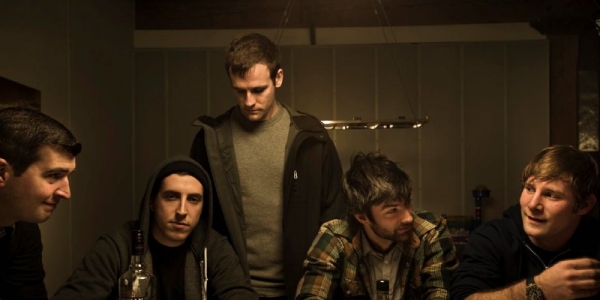“Before the band was even set in stone there was just the first record written instrumentally, and then we talked about what the record should be about,” says vocalist Derek Archambault, over the telephone from Portsmouth, New Hampshire. “It was definitely planned. [Guitarist] Jay [Maas] and I both agreed that it should be a fictitious concept record loosely based on whatever I wanted.” From this beginning the discography began to unfold, and an alter-world was fleshed out. “Everything about Defeater is trapped within this storyline and timeline and these characters,” Archambault says.
It doesn’t mean the band’s sound is limited, though, despite the expectations a listener might hold for this particular genre. Countless reviewers mark Defeater as being at the top of their game, and even out of reach to their musical peers because of their experimentation in mixing acoustic ballads and heavy metal. “I’m not really the best judge of hardcore bands because I don’t really listen to a lot of it anymore, [but] I listen to ‘90s hardcore,” Archambault says. “There’s a lot of great bands doing a lot of great things. They’ve all coincidentally become our friends, so I might be a little biased.”
The problem with a particular genre’s definition, and its stigmas or otherwise, is obviously something Archambault feels he has to address as it becomes clear he doesn’t like some of the language I’m using (even though it feels neutral to me). “I feel like stuff gets lumped in,” he explains. “The more metal leanings of hardcore and metalcore, I feel like that is really stagnant, but I don’t think that we really sit in that. I feel like with hardcore, there’s always something keeping it fresh, and [new]. There’s all these bands coming up that take something old and give it a new spin.”
Disciples of the band are a particularly zealous species, with an impressive collection of truly gorgeous fan art up on Instagram and Twitter. Archambault says he doesn’t spend a lot of time on social media, but loves what he sees at shows. “It’s incredibly flattering when, you know, some kids come up to us and say ‘Hey, I’ve got this Defeater-inspired tattoo,’ or ‘Your record’s influenced my life in this way,’ or just to sit and talk about how somehow our little shit band has been able to change them in some way,” he says pointedly. “I don’t pay attention to that stuff online but it means the fucking world to me when it happens in person.”
Included in ‘that stuff online’ is Facebook, so Archambault can’t say which of his bandmates recently posted a status update quoting Chicago performer Wesley Willis. He does, however, explain a bit about the man and it seems to reflect his interest in those people who sit outside convention. “Wesley Willis was a schizophrenic man [who] recorded songs on a shitty little [Casio] keyboard and a tape recorder. He turned into this huge cult phenomenon and toured and then he passed away. I played a festival with him. He got a lot of shit. People kind of made fun of him, they kind of weren’t really laughing with him a lot of the time. He wrote music about rock ‘n’ roll and McDonald’s.” Willis’ material was released on Jello Biafra’s Alternative Tentacles label, and Archambault makes a point of saying that “The people putting out his records actually believed in him.”
When the band get back from Australia the plan is to begin the writing process again, and then record in Maas’ new studio. In addition to playing guitar with the band, Maas is a highly respected producer and mixer. “We’ll record everything with Jay, and it’s going to take who knows how long? We get to work at our own pace, so that’s what’s nice. We don’t have to answer to anyone at a studio, we don’t have to like, practice or write for months and months and months and then just go try bang it all out.”
BY ZOË RADAS







